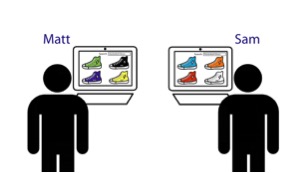

| Online: | |
| Visits: | |
| Stories: |

| Story Views | |
| Now: | |
| Last Hour: | |
| Last 24 Hours: | |
| Total: | |
Personalized online shopping is both good and bad
Read aguanomics http://www.aguanomics.com/ for the world’s best analysis of the politics and economics of water
Esmee writes*
We’ve all been there. After creating an account on a website in order to search for a hotel room offer for your next holiday, you re-open the webpage and on the side of your screen you see advertisements with discounts for the exact same hotel.
The increasing possibilities for “personalized shopping” are becoming more popular. Websites suggest products based on search history and account information. This form of personalized shopping, which has increased in frequency in the past few years due to technological advances, is often praised as a good development that saves effort for people with little time.
However, it also has disadvantages. A recent study [pdf] conducted by researchers from Northeastern University has shown that online retailers customize the prices of certain products and manipulate the products that are being shown, based on personal characteristics, such as age, income, or purchasing history.
These actions maximize profits by so-called “price discrimination”: retailers charge different prices for different customers for the same product, based on their price elasticity of demand. This strategy is based on the fact that not every consumer has the same sensitivity to price changes. Students for example, who have a low income and live off their STUFI [student subsidy], might be more sensitive to price changes of hotel rooms and represent an elastic demand, whereas business travelers are less sensitive to price changes and represent an inelastic demand. Companies use this information to charge the maximum price a specific consumer is willing to pay.
The Northeastern study has shown that online retailers such as Orbitz, a travel company, use this strategy to, for example, show MAC users more expensive hotels than PC users, because they assume that MAC users are willing to pay more for hotel rooms than PC users. Similarly, they show discount prices solely to their members. The technological advances have made it relatively easy for such companies to do this, and such strategies have significantly boosted sales.
Such practices are often argued by consumers to be unethical, and some even think it should be illegal. However, companies simply argue that they use “all the tools” that are available to them, in order to find out which products are appreciated most by their customers. In that case, as long as technology keeps advancing, the best solution for consumers to avoid price discrimination might simply be to search for products in multiple ways, using different browsers, accounts, and devices.
Bottom Line Whereas personalized online shopping is often seen as a good development, it has significant disadvantages for consumers when online retailers use people’s personal information to price discriminate and raise their profits.
* Please comment on these posts from my microeconomics students, to help them with unclear analysis, other perspectives, data sources, etc.
Source: http://www.aguanomics.com/2016/02/personalized-online-shopping-is-both.html




